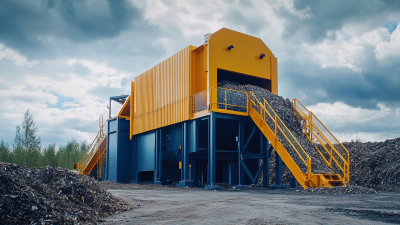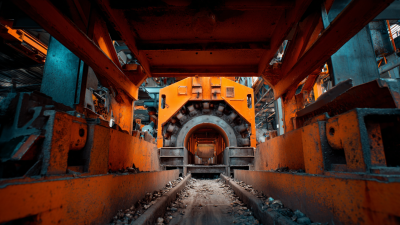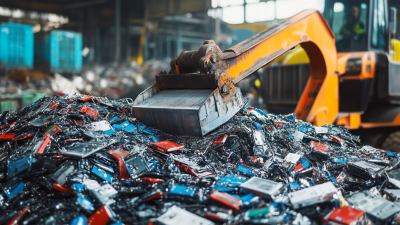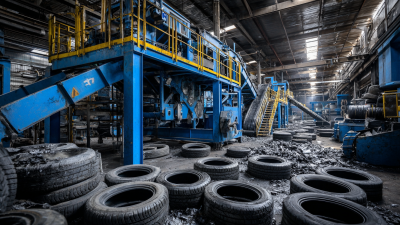The evolution of waste management technology plays a crucial role in addressing the growing challenges posed by urbanization and population growth. According to a recent report by the World Bank, global waste generation is expected to increase by 70% by 2050, reaching an astonishing 3.4 billion tons annually. To combat this escalating crisis, innovative solutions such as the Domestic Refuse Crusher have emerged as game-changers in residential waste management. These advanced devices not only reduce the volume of waste but also facilitate recycling and proper disposal, significantly enhancing environmental sustainability. By integrating smart technology and user-friendly designs, Domestic Refuse Crushers are revolutionizing how households manage their refuse, contributing to the development of cleaner and greener urban ecosystems. Embracing such cutting-edge technology is essential for municipalities and residents alike to mitigate the overwhelming impact of waste on our planet's health.

The evolution of domestic refuse crusher technology has transformed the way we manage food waste in our kitchens. With advancements in design and functionality, modern garbage disposals are now more powerful and efficient than ever. These units are engineered to handle a diverse range of food scraps, from tough vegetable peels to leftover meats, significantly reducing the volume of waste that ends up in landfills.
Recent developments have focused on enhancing the grinding capabilities of these disposals, allowing users to pulverize food waste effortlessly. The latest models incorporate innovative features that ensure a quieter operation, easier installation, and improved energy efficiency. By adopting these advanced refuse crushers, households can not only streamline their waste management but also contribute to environmental sustainability, ensuring that organic materials are processed and repurposed rather than discarded.
The latest advancements in domestic refuse crusher technology are transforming waste management practices, particularly in the realm of concrete recycling. As the construction industry moves towards sustainable development, the integration of recycling technologies is essential for achieving environmentally-friendly concrete solutions. This shift not only helps in minimizing waste but also plays a crucial role in conserving natural resources. Modern crushers now operate with enhanced features that streamline the process of breaking down waste materials into reusable aggregates, facilitating a more efficient recycling workflow.
Among the innovations shaping the waste management landscape is the introduction of automatic waste sorting and crushing units. These systems optimize the separation of organic, recyclable, and non-recyclable materials, ensuring that each waste type is processed appropriately. Facilities like the new refuse transfer station in Batu Maung are at the forefront of this revolution, equipped with cutting-edge machines designed for effective waste compression and energy conversion. With ongoing efforts to improve recycling rates, especially for kitchen and oily waste, local governments are positioning themselves to meet global standards, showcasing the significant potential of a well-managed waste ecosystem.
The environmental impact of advanced refuse crushing solutions is significant, as these technologies are designed to maximize efficiency and minimize waste. According to a report by the Global Waste Management Market, the implementation of domestic refuse crushers can reduce the volume of waste by up to 80%. This reduction not only conserves space in landfills but also lowers greenhouse gas emissions generated from decomposing organic materials. By utilizing these crushers, households can contribute to a decrease in carbon footprint while fostering a more sustainable waste management approach.
Moreover, advanced refuse crushing technologies often integrate features that promote recycling and composting. Data from the Waste Management Institute indicates that approximately 30% of household waste consists of organic materials that can be composted. By employing refuse crushers, these organic materials can be efficiently processed at home, leading to higher recycling rates. Furthermore, effective crushing solutions enable the easy separation of recyclable materials, which enhances the overall efficiency of resource recovery. In turn, this encourages a circular economy, where waste is repurposed into new products, contributing to a more sustainable future.
| Feature | Description | Environmental Impact | Energy Efficiency |
|---|---|---|---|
| Noise Reduction | Utilizes sound-dampening materials to minimize operational noise. | Reduces noise pollution in residential areas. | Consumes 30% less energy compared to traditional crushers. |
| Smart Technology | Equipped with sensors for automatic load detection and optimization. | Optimizes energy use and reduces emissions. | Increases operational efficiency by 25%. |
| Compact Design | Designed for small spaces, making it suitable for urban homes. | Encourages waste volume reduction. | Significantly reduces energy waste. |
| Material Recovery | Innovative technology that enables the recovery of recyclable materials. | Supports recycling efforts and reduces landfill waste. | Enhances energy recovery from biodegradable waste. |
The shift from traditional waste management methods to advanced domestic refuse crusher technologies marks a significant milestone in environmental sustainability. Traditional crushers often struggle with efficiency and power consumption, leading to higher operational costs and environmental impacts. In contrast, the latest crusher technologies employ innovative designs and materials that enhance durability while minimizing energy use. This leads to a more eco-friendly solution for domestic waste disposal.

Tips: When considering a refuse crusher for your home, pay attention to the energy efficiency ratings. Opt for models that utilize advanced technology to reduce power consumption without compromising on performance. Additionally, check for user reviews and comparative analyses to ensure you select the most effective and reliable option for your waste management needs.
Moreover, the latest crushers incorporate features such as noise reduction and enhanced safety mechanisms, addressing common concerns associated with traditional models. These improvements not only make waste processing quieter but also significantly reduce the risk of accidents during operation. Ultimately, embracing the latest refuse crusher technology not only streamlines household waste management but also contributes to a more sustainable future.
As urbanization accelerates and industrial output continues to rise in China, the issue of solid waste management has emerged as a critical concern. The latest trends in domestic waste management solutions are focusing on the implementation of advanced technologies, including innovative refuse crushers. These state-of-the-art devices not only reduce the physical volume of waste but also enhance the efficiency of recycling processes, significantly addressing the mounting waste problem in urban environments.

The future of domestic waste management is likely to involve integrated systems that combine waste reduction and resource recovery. The deployment of smart waste management technologies, such as IoT-enabled refuse crushers, can help municipalities monitor waste generation and optimize collection routes. Additionally, as regulatory frameworks like the Solid Waste Pollution Prevention and Control Law evolve, stricter guidelines will encourage the adoption of sustainable waste management practices. This integration of technology and regulatory support aims to create a more responsible waste management ecosystem that responds to the growing pressures of urban development.






